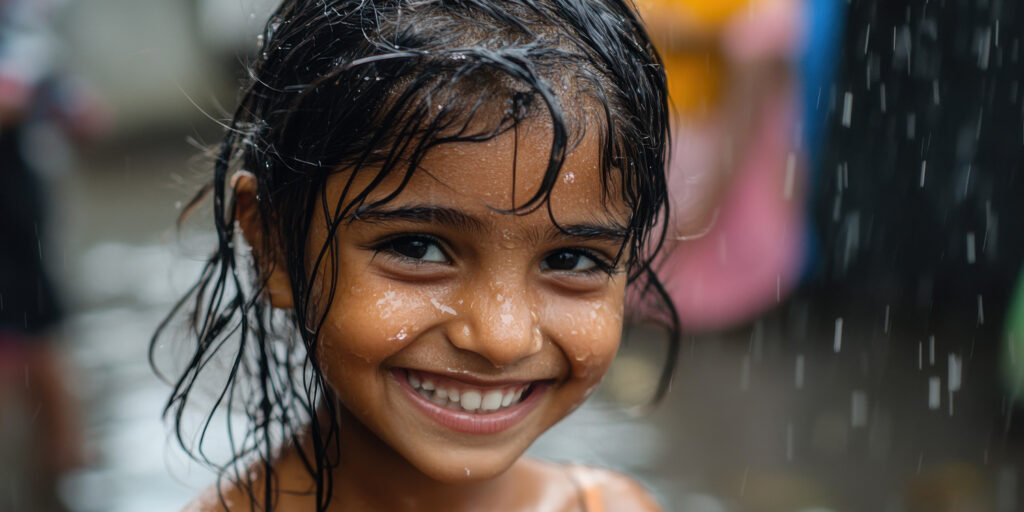Is Your Child Monsoon-Ready? Boosting Immunity Naturally

As the monsoon clouds roll in with their refreshing showers, they also bring along a host of seasonal infections, especially for young children. From sniffles and sore throats to sudden fevers and digestive troubles, this time of year can challenge even the healthiest immune systems. So, how can parents ensure their children stay strong and resilient during the rainy season? The answer lies in natural immunity-boosting practices that are safe, effective, and rooted in everyday habits. In this article, we explore some simple yet effective ways to strengthen your child’s immunity, so they can enjoy the magic of monsoons without falling prey to seasonal bugs. Let’s start with understanding the basics.
Table of Contents
ToggleWhat is Immunity?
Immunity is the body’s natural ability to fight off germs and protect itself from illnesses. It works like a defence system, helping the body recognise harmful invaders such as viruses, bacteria, or parasites, and respond quickly to stop them from causing serious harm.
Children, especially in their early years, are still building their immunity. This means they can be more likely to catch infections, especially during seasons when illnesses spread easily. By understanding how immunity works, it becomes easier to take simple steps to keep it strong and active throughout the year.
Types of Immunity in Children
Children are born with some level of protection against infections, but their immune system continues to develop over time. There are different types of immunity that work together to keep them healthy:
- Innate Immunity: This is the body’s first line of defence and is present from birth. It acts quickly when germs enter the body but is not specific to any particular disease.
- Acquired Immunity: Also known as adaptive immunity, this develops as children grow and are exposed to different infections or receive vaccines. It helps the body remember and fight off specific germs more effectively in the future.
Within acquired immunity, there are two forms:
- Active Immunity: This happens when the body produces its own antibodies after an infection or vaccination. It lasts longer and helps prevent repeated illness.
- Passive Immunity: This is when ready-made antibodies are passed to the child, such as from the mother during pregnancy or through breast milk. It provides short-term protection.
Understanding these types of immunity helps explain why vaccination, good nutrition, and hygiene are important for keeping children healthy, especially during the monsoon.
Read More: Hand Hygiene Awareness for a Healthier Future
Why Immunity Matters More During the Monsoon
The monsoon season increases the risk of infections due to damp weather, stagnant water, and poor sanitation. These conditions allow germs and mosquitoes to thrive, making children more vulnerable to falling sick.
A strong immune system acts like a shield, helping children fight off common monsoon-related illnesses such as coughs, colds, stomach infections, and mosquito-borne diseases. Since children’s immunity is still developing, even minor infections can affect their energy levels, appetite, and growth.
That’s why it becomes especially important during the monsoon to focus on immunity, through good hygiene, healthy food, and timely vaccination, to help children stay active and infection-free throughout the season.
Common Monsoon-Related Illnesses in Children
During the rainy season, children are more likely to come into contact with contaminated water, damp surroundings, and mosquito bites – all of which can lead to various health problems. Some of the most common monsoon-related illnesses seen in children include:
- Respiratory infections: Colds, coughs, throat irritation, and viral fevers become frequent due to sudden weather changes and increased humidity.
- Gastrointestinal infections: Eating contaminated or stale food can cause diarrhoea, vomiting, and stomach pain.
- Mosquito-borne diseases: Stagnant water becomes a breeding ground for mosquitoes, increasing the risk of diseases such as malaria and dengue.
- Skin infections: Wet clothes, poor hygiene, and exposure to dirty water may lead to rashes or fungal infections.
While many of these illnesses are treatable, children with lower immunity may take longer to recover or may fall sick repeatedly. This makes immune support a key part of monsoon care.
How to Boost Child Immunity Naturally
Supporting a child’s immune system doesn’t always require supplements or medicines—many simple, everyday habits can make a big difference. Strengthening immunity naturally is about maintaining a healthy routine and avoiding things that weaken the body’s defences.
Here are some effective ways to boost child immunity, especially during the monsoon:
- Balanced nutrition: Include a mix of seasonal fruits, vegetables, whole grains, and protein-rich foods in daily meals. This provides essential vitamins and minerals that help fight infections.
- Adequate sleep: Children need enough rest to allow the body to repair and build immunity. Maintaining a proper sleep schedule is crucial, especially when they are unwell or recovering.
- Physical activity: Light exercise, playtime, and movement help improve circulation and overall immune function, even if done indoors during the rainy season.
- Personal hygiene: Regular handwashing, bathing, and wearing clean, dry clothes help prevent the spread of germs and reduce exposure to infections.
- Avoid overuse of antibiotics: Relying on antibiotics without medical advice can weaken natural immunity over time.
Immunity-Boosting Foods for Kids
Food plays a powerful role in keeping a child’s immune system strong. Including the right ingredients in their daily meals can help the body fight off infections naturally—especially during the monsoon, when the risk of illness is higher.
Here are some Indian foods known to support immunity in children:
- Turmeric: Contains curcumin, which has natural anti-inflammatory and antibacterial properties. A warm glass of turmeric milk is a traditional remedy for coughs and colds.
- Ginger and tulsi: Both have antimicrobial qualities and help soothe respiratory symptoms. They can be added to herbal teas or soups.
- Seasonal fruits: Citrus fruits such as oranges, sweet lime, and guava are rich in vitamin C, which boosts immune function. Papaya and banana also aid digestion and recovery.
- Dry fruits and nuts: Almonds, walnuts, and dates provide essential nutrients like zinc, vitamin E, and healthy fats that help build resistance.
- Whole grains and pulses: Whole grains and pulses: Brown rice, millets, and dals are rich in iron and protein, which are important for preventing anaemia and supporting energy levels.
- Homemade soups and khichdi: Easy to digest and rich in nutrients, these warm foods are perfect for monsoon meals and support gut health.
Foods to Avoid During the Monsoon
Just as certain foods help build immunity, others may increase the risk of infections—especially during the damp and humid conditions of the monsoon. Being mindful of what children eat can go a long way in preventing illness.
Here are some foods best avoided during the rainy season:
- Street food: Items such as chaats, golgappas, and roadside juices may be prepared in unhygienic conditions and can lead to stomach infections.
- Raw or uncooked foods: Salads, cut fruits from outside, and undercooked meat can carry harmful bacteria or parasites.
- Stale or leftover food: Moist weather increases the risk of food spoilage, even when stored in the fridge. Always serve freshly cooked meals.
- Unpasteurised dairy: Milk or milk-based products that are not properly boiled or pasteurised can cause digestive issues.
- Fried and oily snacks: While tempting, these can slow digestion and make the body more prone to colds or sluggishness.
Avoiding these items helps reduce the load on the digestive system and supports better immunity, especially for children whose systems are still developing.
Importance of the Child Vaccination Schedule
Vaccination is one of the most effective ways to protect children from serious infections. It strengthens their acquired immunity by preparing the body to fight specific diseases before they are exposed to them.
During the monsoon, when infections spread more easily, staying up to date with the child vaccination schedule becomes even more important. Certain vaccines help guard against illnesses that are more common during this season, such as flu, hepatitis A, and typhoid.
Regular vaccinations also:
- Prevent the spread of contagious diseases in schools and communities
- Reduce the need for antibiotics and hospital visits
- Help children recover faster from common infections
Parents should consult a trusted paediatrician in Dehradun or their local healthcare provider to ensure that their child’s vaccinations are current and to discuss any recommended seasonal boosters.
When to Consult a Paediatrician
While minor colds or occasional stomach upsets are common during the monsoon, some symptoms may signal a deeper concern and should not be ignored. Early consultation with a paediatrician helps prevent complications and ensures timely care.
Parents should seek medical advice if a child shows:
- Frequent or prolonged fevers
- Loss of appetite, persistent tiredness, or low energy
- Recurrent coughs, colds, or breathing trouble
- Loose motions or vomiting lasting more than a day
- Skin rashes, ear pain, or signs of dehydration
If a child falls sick repeatedly during the rainy season, it could point to a weakened immune system or nutritional deficiency. A qualified paediatrician can assess the child’s health, recommend necessary tests, and provide guidance on child nutrition and lifestyle changes to support immunity.
How Graphic Era Hospital Supports Child Health During Monsoon
At Graphic Era Hospital, children’s health is a priority, especially during seasons when infections are more common. The hospital offers a range of services to help strengthen immunity, prevent illness, and manage common monsoon-related health concerns.
Here’s how Graphic Era Hospital supports families during the rainy season:
- Experienced paediatricians in Dehradun: Experienced in treating seasonal infections and providing preventive care tailored to each child’s needs.
- Guidance on child nutrition and immunity boosters: Personalised dietary plans and tips to help improve natural immunity through food and lifestyle.
- Up-to-date vaccination support: Ensuring children stay protected by following the recommended child vaccination schedule.
- Care for seasonal infections: Timely diagnosis and treatment of common illnesses such as flu, diarrhoea, and mosquito-borne diseases.
With a child-friendly environment and expert care, Graphic Era Hospital helps parents navigate the monsoon season with greater confidence and peace of mind.
Final Word
Children need extra care during the monsoon, as their bodies are still developing the strength to fight off infections. Supporting their immunity through healthy food, proper hygiene, and timely vaccinations can go a long way in keeping them safe and active throughout the season. For expert advice, seasonal care, and personalised support, consult a trusted paediatrician at Graphic Era Hospital. Call 18008897351 to book an appointment and take the first step towards a healthier monsoon for your child.
Frequently Asked Questions
How to increase immunity power in a child during the monsoon?
A child’s immunity can be strengthened through a balanced diet, enough rest, daily hygiene, regular playtime, and staying up to date with vaccinations. Adding warm, home-cooked meals and seasonal fruits can also help.
Which Indian foods help boost child immunity?
Foods such as turmeric milk, tulsi, ginger, amla, oranges, guava, almonds, and homemade soups are excellent immunity boosters for children. Whole grains and pulses also support long-term health.
What are the signs of low immunity in children?
Frequent infections, slow recovery, tiredness, poor appetite, and repeated fevers or colds may indicate low immunity. If such symptoms persist, it’s best to consult a paediatrician.
What is the difference between active and passive immunity in kids?
Active immunity develops when a child’s body produces its own antibodies through vaccines or natural infection. Passive immunity is short-term and is passed from the mother during pregnancy or through breast milk.
How important is vaccination for child immunity?
Vaccination plays a key role in building a child’s acquired immunity and protecting against preventable diseases. Following the recommended vaccination schedule is essential for good health.
Where can I find a good paediatrician near me during the monsoon season?
Graphic Era Hospital has experienced paediatricians in Dehradun who offer expert care and guidance for seasonal infections, immunity support, and child nutrition. Call 18008897351 to book an appointment.
What are the best kids immunity boosters during the monsoon?
Kids immunity boosters during the rainy season include natural options such as tulsi, turmeric, ginger, amla, and warm soups made from lentils and seasonal vegetables. These help strengthen the immune system without the need for synthetic supplements.
How to improve immunity and protect children from seasonal infections?
To improve immunity, ensure children eat immune boosting foods, stay physically active, sleep well, and practise proper hygiene. These habits help reduce the risk of common seasonal infections during the monsoon.
What are some foods to increase immunity in children naturally in India?
Indian foods that help increase immunity naturally include khichdi, boiled eggs, ragi porridge, turmeric milk, citrus fruits, dates, and almonds. These are nutrient-dense and suitable for daily meals.
How does a child vaccination schedule support immunity development?
Following the child vaccination schedule builds acquired immunity against several diseases. Vaccines prepare the body to fight specific infections effectively, reducing the chances of serious illness.
What is the role of active and passive immunity in child health?
Active immunity develops when a child produces antibodies through vaccines or past infections. Passive immunity is passed from the mother and offers short-term protection in early life. Both play a key role in a child’s immune defence.
How to increase immunity in children naturally in India without medication?
Focus on home-cooked meals, regular physical activity, adequate hydration, and rest. Include immunity boosting foods for kids such as turmeric, garlic, spinach, and jaggery to increase immunity power naturally.
By Specialities
- Bariatric Surgery
- Cancer Care
- Cardiology
- Dental
- Dermatology
- Diabetes & Endocrinology
- Endocrinology and Diabetes
- ENT (Ear Nose Throat)
- Eye Care
- Gastroenterology
- Haematology
- Health Awareness
- Health Care
- Health Tips
- Hematology
- Hepatology
- Internal Medicine
- Mental Health and Behavioural Sciences
- Metabolic
- Neonatology
- Nephrology
- Neurology
- Nutrition & Dietetics
- Obstetrics & Gynaecology
- Oncology
- Ophthalmology
- Orthopaedics
- Paediatric
- Physiotherapy & Rehabilitation
- Plastic and Reconstructive Surgery
- Psychology
- Pulmonology
- Rheumatology
- Spine
- Urology
Recent Posts
- A Complete Guide to Blood Clots in the Brain
- Heart Attack: Symptoms and Treatment
- World Obesity Day 2026: Understanding, Preventing, and Managing Obesity
- Bacterial and Viral Pneumonia: Causes, Symptoms, and Treatment Options
- World Hearing Day 2026: Empower Yourself to Protect and Improve Your Hearing
Need expert medical advice?
Share your details and our healthcare specialists will reach out to assist you.
By proceeding, you acknowledge and agree to our Privacy Policy, Terms of Use, and Disclaimer.




















